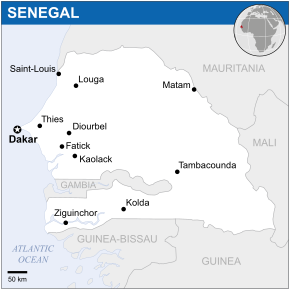More languages
More actions
General-KJ (talk | contribs) (Expanded the article) Tag: Visual edit |
General-KJ (talk | contribs) m (Minor changes) Tag: Visual edit |
||
| Line 14: | Line 14: | ||
=== Independence === | === Independence === | ||
Senegal became a state in the French Community in 1958 and in January 1959 it joined with the colony of French Sudan (modern day Mali) as the [[Mali Federation (1959–1960)|Mali Federation]]. On April 4 the Mali Federation made an agreement with France to become independent with independence being declared on June 20. The Federation was short lived and broke down | Senegal became a state in the French Community in 1958 and in January 1959 it joined with the colony of French Sudan (modern day Mali) as the [[Mali Federation (1959–1960)|Mali Federation]]. On April 4,1960, the Mali Federation made an agreement with France to become independent with independence being declared on June 20. The Federation was short lived and broke down 2 months later and on August 20, 1960 Senegal was declared an independent state, albeit one in close cooperation with the [[Imperialism|imperialists]].<ref name=":1" /> | ||
=== 2023 protests === | === 2023 protests === | ||
Latest revision as of 19:57, 2 August 2024
| Republic of Senegal جمهورية السنغال 𞤈𞤫𞤲𞤣𞤢𞥄𞤲𞤣𞤭 𞤅𞤫𞤲𞤫𞤺𞤢𞥄𞤤𞤭 Réewum Senegaal | |
|---|---|
 | |
| Capital and largest city | Dakar |
| Official languages | French |
| Common languages | Arabic Pulaar Wolof |
| Dominant mode of production | Neocolonial capitalism |
| Government | Neocolonial bourgeois republic |
• President | Bassirou Diomaye Faye |
• Prime Minister | Ousmane Sonko |
| Area | |
• Total | 196,712 km² |
| Population | |
• 2024 estimate | 18,847,519 |
Senegal, officially the Republic of Senegal, is a country in West Africa bordered by Mauritania, Mali, Guinea, Guinea-Bissau and Gambia. Due to French colonial exploitation, it has a poverty rate of 40% and rising unemployment and inequality.[1]
History[edit | edit source]
Pre-colonial[edit | edit source]
At various times in the medieval era the territory of modern Senegal was controlled by different empires such as Ghana, Mali and Songhai. In the middle ages several states flourished in the region starting with Tekrur, with Jolof later breaking away from it in the 16th century and the Kingdoms of Waalo, Baol, Sine, Saloum and Cayor later broke away from Jolof. Islam came to the region in the 11th century and between the 12th and 16th centuries it became accepted by the majority of the population.[2]
Colonial period[edit | edit source]
The Portuguese came to Senegal in the 15th century and began exporting raw resources such as ivory and gold from the region. In the 16th and 17th centuries Portugal, the Netherlands, Great Britain and France squabbled over control of the region with France winning out and establishing the Senegal Company in 1633 to begin setting up trading posts.[2]
The indigenous population resisted the colonialists valiantly but by the end of the 19th century France had annexed most independent states and included Senegal in French West Africa in 1895. Senegal's economy began based on cash crops such as peanuts and the oppressors used forced labour and unequal exchange whilst building railroads and industry for their own purposes.[2]
Independence[edit | edit source]
Senegal became a state in the French Community in 1958 and in January 1959 it joined with the colony of French Sudan (modern day Mali) as the Mali Federation. On April 4,1960, the Mali Federation made an agreement with France to become independent with independence being declared on June 20. The Federation was short lived and broke down 2 months later and on August 20, 1960 Senegal was declared an independent state, albeit one in close cooperation with the imperialists.[2]
2023 protests[edit | edit source]
In 2023, protests began against neocolonial president Macky Sall after he tried to get an unconstitutional third term. So far, 16 people have died, 300 have been injured, and 500 have been arrested. The protestors support Ousmane Sonko, an anti-French opposition leader who was arrested by Sall. Journalist Pape Alé Niang was also arrested for releasing a police report that cleared Sonko of a rape charge.[1]
Politics[edit | edit source]
Sonko leads the PASTEF (African Patriots of Senegal for Work, Ethics, and Fraternity) Party, which supports the youth and working class against the corrupt elite and supports state-led development. He also wants to remove Senegal's dependence on the Central African franc, a neocolonial currency. Sonko won 15% of the vote in the 2019 presidential election against Sall.[1]
References[edit | edit source]
- ↑ 1.0 1.1 1.2 Bezaleel Jupiter (2023-06-14). "Why are protests flaring in Senegal?" Liberation News. Retrieved 2023-06-15.
- ↑ 2.0 2.1 2.2 2.3 L. O. Nizskaia (1979). The Great Soviet Encyclopedia: 'Senegal, Republic Of; Historical survey'.


